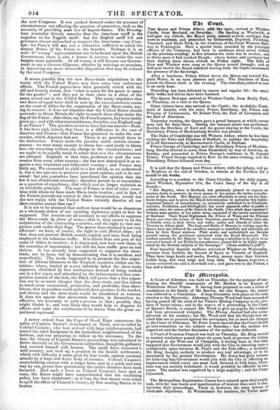It seems possible tha,t the new Slave-trade stipulations in the
treaty with the United States may have some very unforeseen effects. The French papers have been generally struck with the old and homely truism, that "what is sauce for the goose is sauce for the gander" ; and they put in their claim to a share of the sauce served out to the United States. The treaty stipulates that two fleets of equal force shall be sent by the two countries to cruise on the coast of Africa for the suppression of the Slave-trade, act- ing in concert : it does not stipulate that the United States should surrender to Great Britain the right to search slave-ships under the flag of the Union : that claim, say the French papers, has been tacitly given up ; and with what reasonableness, therefore, can England urge it on France ? The question seems to have but one answer—None. It has been said, indeed, that there is a difference in the case of America and France—that France has promised to make the con- cession, which America had not. There is no practical force in the distinction. France made the promise under certain circum- stances: we were ready enough to blame her—and justly to blame her—for retracting without any change in the circumstances; and we ought to be equally ready to admit that now the circumstances are changed. England, at that time, professed to seek the con- cession from every other country ; she has now abandoned it as re- spects a very important and influential country ; and France may fairly say, We consented to yield to a law which, as we understood it, was a sine qua non to preserve your good opinion, and to be uni- versal: but you yourselves have sanctioned the opinion that the law is not of universal necessity ; therefore permit us to reconsider, as a question of expediency, that which you no longer maintain as an inviolable principle. The case of France is that of other coun- tries with wheat we have made Slave-trade treaties; and in fact, if the French journals are correct in their interpretation, would not the new treaty with the United States virtually dissolve all our slave-treaties except that one ?
It is not to be assumed that such an issue would be so disastrous as a wholesale defeat of our standing diplomacy might at first be supposed. The treaties are all auxiliary to our efforts to suppress the Slave-trade by force of arms,—that is, they secure to us the cooperation of the contracting countries, and the right to visit sus- picious craft under their flags. The power thus obtained is not very effectual : we have, of course, the right to visit British ships; yet that does not prevent British vessels, capital, and men, from being employed in the infamous traffic. It is driven from one part of the coast of Africa to another ; it is depressed, now here now there, in the countries of importation ; but still the base traffic goes on and thrives. It has recently been suggested to suppress the slave- trade, not by force, but by demonstrating that it is needless and unprofitable. The mode suggested is, to promote the free migra- tion of African labourers to the Tropical countries within our do- minion ; where, landed at a cost infinitely below the slave-trade expenses, cherished by free institutions instead of being worked out in a few years, and stimulated by the inducements of free com- petition instead of the lash, the Black will prove that a free migra- tion can be so much cheaper than the slave-trade, and free labour so much more economical, productive, and profitable, than slave- labour, that its produce could undersell slave-produce in the market, and slavery and the slave-trade would be abandoned as ruinous. It does not appear that slave-trade treaties, in themselves in- effective, are necessary to such a process as that ; possibly they might hinder it ; and very likely they would help to disguise its effects and make the conclusions to be drawn from the great ex- periment equivocal.


























 Previous page
Previous page